Steve Thompson recalls signs of his early-onset dementia
We use your sign-up to provide content in ways you’ve consented to and to improve our understanding of you. This may include adverts from us and 3rd parties based on our understanding. You can unsubscribe at any time. More info
Many of us associate dementia with getting older. The syndrome is much more common among those aged 65 and over. However, it can affect people of all ages – and it’s important to pick up on symptoms as soon as possible.
Dementia is a term used for a range of conditions that affect the brain.
Each of these conditions prevents the brain cells – or neurons – from functioning properly, which will impact their memory, thoughts and speech.
Early onset dementia refers to dementia experienced by someone under the age of 65 – usually between 30 and 65.
It is thought more than 42,000 people in the UK are living with early onset dementia, or are “younger people with dementia”.

Due to their age, it can be harder to get a diagnosis.
According to Dementia UK one common early symptom of dementia in younger people is a change in their balance.
Their vision could also alter.
The charity says: “If someone is showing signs of dementia, it is important to visit a GP as soon as possible.
“There are many other conditions that have similar symptoms, such as infections, thyroid
problems, stress, depression, perimenopause/menopause and dietary deficiencies.
“These may be treatable, so the GP may request investigations such as blood tests and X-rays to check for any underlying conditions.
“Once the GP has ruled out other causes, they may refer the person for further investigation and assessment – this may be with a specialist memory service, or a cognitive disorders or neurology clinic.”
Other symptoms of early onset dementia include changes in:
- Personality and behaviour
- Speech and language
- Social functioning
- Relationships with others
- Involvement in daily activities
- Motivation and mood
- Concentration levels
- Decision-making
- Problem-solving.

Dementia UK explains: “The symptoms of dementia differ from person to person, depending
on the type of dementia and which parts of the brain it affects.
“It is often associated with memory loss, but this is less likely to be an early symptom for people with young onset dementia.
“As a result, the signs of dementia may be missed or mistakenly attributed to other conditions.”
Approximately 20 percent of those with early onset dementia have a “rarer” form of the condition.

This includes conditions that result in dementia like Parkinson’s disease, Huntington’s
disease and Creutzfeld Jakob disease (CJD).
“Younger people are also more likely to have an inherited form of dementia caused by genetic mutations, including familial Alzheimer’s disease, familial frontotemporal dementia and familial vascular dementia,” Dementia UK adds.
If a person is diagnosed with early onset dementia they should be referred
for further assessments and support that could help.
In some cases they could be prescribed medications to help ease some of the symptoms although these are not always suitable.
Source: Read Full Article
